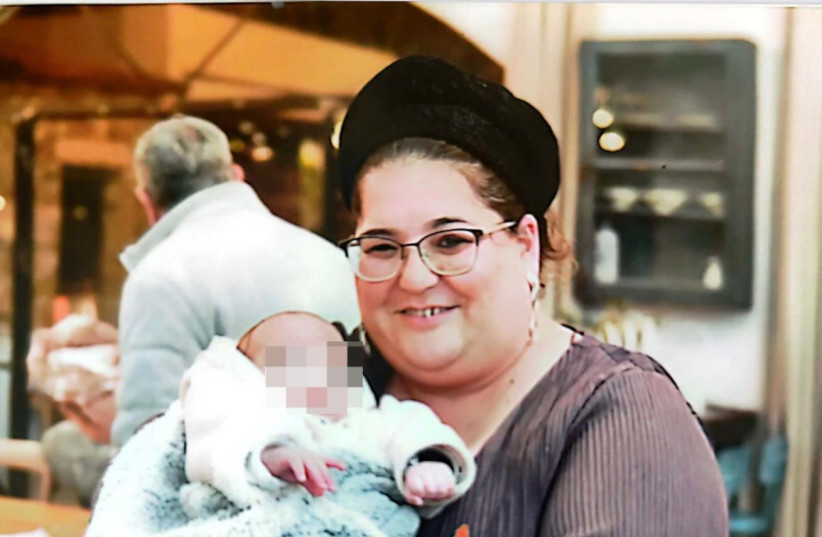“I heard three shots. The windows completely shattered, and you were no longer conscious,” said Shirel Nigri, 12, as she eulogized her mother Batsheva, 42, by recalling the moment of her death in a terror attack.
What began as a fun mother-and-daughter day out on Monday morning ended with a tearful late-night funeral in the Kfar Etzion cemetery.
They had set out from their home in the Beit Hagai settlement, having caught a ride with a neighbor, Aryeh Gottlieb, 39, to Jerusalem to get together with cousins.
Along the way, they had planned to stop at Batsheva’s preschool classroom in Efrat to set it up for the coming school year.
But they only made it as far as the Beit Hagai junction close to the Palestinian city of Hebron, when two terrorists sprayed the car with bullets, killing Batsheva and seriously wounding Aryeh.

Out of the three in the vehicle, the small black-haired girl was the only one to emerge unscathed, retaining enough presence of mind to call for an ambulance.
Shirel told the emergency services operator, “they shot us, come quickly.” She recalled that “My voice was tense. I was shaking.”
When the paramedics arrived, “they took care of you and paid you back for all the good you did for everyone,” Shirel told the mourners, addressing her mother whose shroud-wrapped body lay on a stone slab in front of the podium where she stood.
'I envy all the angels who are privileged to have you in heaven.'
“You were the happiest person I know... You always said that your heart was wide and open to everyone,” Shirel stated.
“Mom, I want to give you one last hug. I miss you and I will always miss you. You are always in my heart. I know that you are watching over me, even when I can not see you. You always looked after me,” she recalled.
“I am asking you, mother, to take care of me, of father, of all of us. And don’t ever leave me,” Shirel pled.
“I envy all the angels who are privileged to have you in heaven.
“I love you. I promise you that you will always be in my heart, and my children will know what a lioness mother I had,” Shirel pledged.
Her grandmother, Batsheva’s mother Tzipora, recalled how she had struggled to get pregnant with Batsheva, praying for seven years for her birth.
“You were my oldest, the one that made me a mother,” Tzipora said, adding that after Batsheva, the other births came more easily.
“You brought so much joy and love into our lives,” Tzipora said, speaking in a low voice that was amplified by a microphone.
Her daughter, Tzipora explained, was a beloved preschool teacher in Efrat, where she had grown up.
“She loved the children and was very attentive to them and to their parents,” Tzipora recalled.
It was a profession that “fit her like a glove.” Everyone battled to be in her class, wanting to be the ones privileged to get such a great teacher, explained Tzipora. “For this next year, there is a class list, but no teacher.”
Batsheva’s brother, Yisrael, said he felt guilty that he had not pushed her and her husband Eli harder to move out of Beit Hagai, given how dangerous it was to live there.
“I am angry with myself that although I told you and Eli to leave Beit Hagai and to preserve your lives, I did not press the point enough. If I could have changed your minds, maybe I could have saved you,” he said.
But watching the way the community had responded to the tragedy had given him a window through which to understand why they had stayed, he explained.
Yisrael recalled how they had seen each other just three weeks ago, explaining that since he moved to the north of the country he had come home less often.
Still, Yisrael said, he remained so close to his sister that they were able to communicate just through glances.
Batsheva’s sister, Miriam, said “I am shattered. You were the most special sister I could have had. You had such a pure heart. You were older by almost 12 years, but the distance seemed less relevant as time went on.
“You helped me with so many things. We would consult with each other in so many situations,” Miriam said, breaking into tears.
“You were able to persevere in so many situations and had so much inner strength. We had so many conversations in which we strengthened each other.
“You never hurt anyone and never said the wrong word. You always brightened up every situation. You were so happy when I got married and then when I got pregnant.
“I am missing you already... I have been looking at all the news websites, Facebook, and Twitter. Everyone is writing about you, but it is the opposite of how you were, so modest. Suddenly you are everywhere, still brightening the world with your smile.”
Batsheva’s husband Eli said, “How can I continue now, all the dreams we shared, how can I do it alone? I so love you... We always told the children that their father and mother were one and could not be separated. Now God decided that we would be.”
